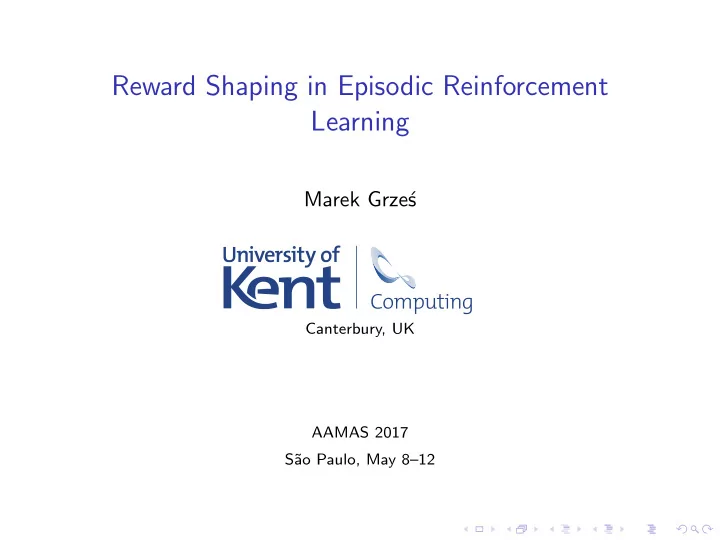

Reward Shaping in Episodic Reinforcement Learning Marek Grze´ s Canterbury, UK AAMAS 2017 S˜ ao Paulo, May 8–12
Motivating Reward Shaping
Reinforcement Learning Agent reward state action r t a t s t r t+ 1 Environment s t+ 1 [Sutt 98] Temporal credit assignment problem
Deep Reinforcement Learning state s t+1 action a t reward r t+1
Challenges state s t+1 action a t reward r t+1 ◮ Temporal credit assignment problem ◮ In games, we can just generate more data for reinforcement learning ◮ However, ‘more learning’ in neural networks can be a challenge ... (see next slide)
Contradictory Objectives http://www.deeplearningbook.org ◮ Easy to overfit ◮ Early stopping is a potential regulariser, but we need a lot of training to address the temporal-credit assignment problem ◮ Conclusion: It can be useful to mitigate the temporal credit assignment problem using reward shaping!
Reward Shaping ◮ � s t , a t , s t +1 , r t +1 � ◮ r t +1 goes to Q-learning, SARSA, R-max etc. ◮ r t +1 + F ( s t , a t , s t +1 ) ◮ where F ( s t , a t , s t +1 ) = γ Φ( s t +1 ) − Φ( s t )
Policy Invariance under Reward Transformations Potential-based reward shaping is necessary and sufficient to guarantee policy invariance [Ng 99] Straightforward to show in infinite-horizon MDPs [Asmu 08] Investigating episodic learning leads to new insights
Problematic Example in Single-agent RL Φ=1000 Φ=10 g 1 g 2 r=0 r=100 a 1 a 2 s i Φ=0 [Grze 10] ◮ F ( s , goal ) = 0 in my PhD thesis ◮ [Ng 99] required F ( goal , · ) = 0 ◮ Φ( goal ) = 0 is what is necessary
Multi-agent Learning and Nash Equilibria *,* x 4 +10 a,a;b,b x 2 a,* a,b;b,a x 1 x 5 start − 10 *,* b,* x 3 x 6 +9 *,* *,* [Bout 99, Devl 11]
Multi-agent Learning and Nash Equilibria *,* x 4 Φ( x 2 ) = 0 +10 Φ( x 4 ) = 0 a,a;b,b Φ( x 1 ) = 0 x 2 a,* a,b;b,a Φ( x 5 ) = M x 1 x 5 start − 10 *,* b,* x 3 x 6 Φ( x 6 ) = 0 +9 Φ( x 3 ) = 0 *,* *,* When M is sufficiently large, we have a new Nash Equlibrium.
PAC-MDP Reinforcement Learning and R-max Optimism in AI and Optimisation ◮ A* ◮ Branch-and-Bound ◮ R-max and optimistic potential functions [Asmu 08]
PAC-MDP Reinforcement Learning and R-max Optimism in AI and Optimisation ◮ A* ◮ Branch-and-Bound ◮ R-max and optimistic potential functions [Asmu 08] Sufficient conditions for R-max ◮ ∀ s ∈ Goals Φ( s ) = 0 ◮ ∀ s ∈ Known Φ( s ) = C where C is an arbitrary number ◮ ∀ s ∈ Unknown Φ( s ) ≥ 0 ◮ where Goals ∩ Known ∩ Unknown = ∅
MDP Planning: Infinite-horizon ◮ MDP solutions methods: linear programming ◮ F ( s , a , s ′ ) = γ Φ( s ′ ) − Φ( s ) ◮ The impact of reward shaping: � λ ( s , a ) T ( s , a , s ′ ) F ( s , a , s ′ ) = − � Φ( s ′ ) µ ( s ′ ) s , a , s ′ s ′
MDP Planning: Finite-Horizon � � � λ ( s , a ) T ( s , a , s ′ ) F ( s , a , s ′ ) a ∈ A s ∈ S \ G s ′ ∈ S � � � � Φ( s ′ ) � λ ( s , a ) T ( s , a , s ′ ) = s ′ ∈ G s ∈ S \ G a ∈ A
References I [Asmu 08] J. Asmuth, M. L. Littman, and R. Zinkov. “Potential-based Shaping in Model-based Reinforcement Learning”. In: Proceedings of AAAI , 2008. [Bout 99] C. Boutilier. “Sequential Optimality and Coordination in Multiagent Systems”. In: Proceedings of the International Joint Conferrence on Artificial Intelligencekue , pp. 478–485, 1999. [Devl 11] S. Devlin and D. Kudenko. “Theoretical Considerations of Potential-Based Reward Shaping for Multi-Agent Systems”. In: Proceedings of AAMAS , 2011. [Grze 10] M. Grzes. Improving exploration in reinforcement learning through domain knowledge and parameter analysis . PhD thesis, University of York, 2010. [Ng 99] A. Y. Ng, D. Harada, and S. J. Russell. “Policy Invariance Under Reward Transformations: Theory and Application to Reward Shaping”. In: Proceedings of the 16th International Conference on Machine Learning , pp. 278–287, 1999. [Sutt 98] R. S. Sutton and A. G. Barto. Reinforcement Learning: An Introduction . MIT Press, 1998.
Recommend
More recommend